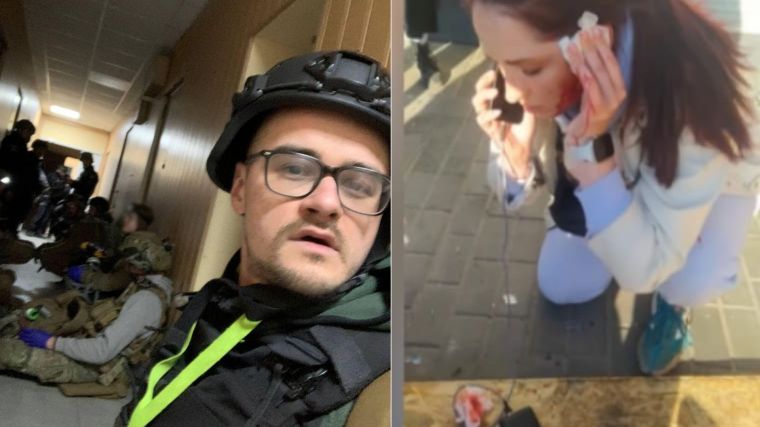New York, April 9, 2024—The Committee to Protect Journalists on Tuesday condemned Russia’s latest series of attacks on Ukraine that injured at least four Ukrainian journalists reporting on the war.
On April 4, two early morning drone strikes hit Kharkiv in northeast Ukraine injuring Yuliya Boyko, a correspondent with the Ukrainian news website Novini.Live and a freelancer with Poland-based independent broadcaster Belsat TV. Viktor Pichugin, a reporter with the Nakipelo news media project covering the Kharkiv region, was also injured in the attacks, according to the local trade group National Union of Journalists of Ukraine (NUJU), the local Institute of Mass Information (IMI) press freedom group, and Pichugin, who spoke to CPJ.
On April 5, Russian forces shelled the southeast region of Zaporizhzhia, injuring Olha Zvonaryova, a reporter with Ukrainian state news agency Ukrinform, and Kira Oves, a reporter with privately owned broadcaster 1+1, according to the NUJU, media reports, and IMI head Oksana Romaniuk, who spoke to CPJ.
“That journalists come under fire while covering the aftermath of previous attacks shows the extent of the risks they are taking and their commitment to documenting Russia’s war in Ukraine,” said Gulnoza Said, CPJ’s Europe and Central Asia program coordinator. “Russian and Ukrainian authorities should investigate the recent attacks that injured Ukrainian journalists in Kharkiv and Zaporizhzhia, and Russia must stop targeting civilian infrastructure in Ukraine.”
Boyko was reporting at the site of a previous drone strike on her home in Kharkiv when another attack hit “5-6 meters” away from her, she told the NUJU and IMI. IMI reported that Boyko did not have time to take cover, and she suffered contusions and a mild concussion from the attack.
Pichugin was reporting on the damage caused by the drone strike on Boyko’s building and on the work of volunteers providing first aid, when the second strike came “very close to him,” he told IMI and local news outlet Gwara Media.
“At some point, the ‘air raid’ cry rang out, and the medics gave the command, ‘Everyone by cars!’” Pichugin told CPJ. As he was taking refuge in the back seat of a car with medics, Pichugin said he heard the drone flying toward them.
“When that last medic closed the trunk lid, the drone exploded. We were thrown by an explosive wave across the cabin,” Pichugin told CPJ, adding that his helmet was knocked off his head from the explosion.
“I have symptoms that might be signs of concussion, but it is still not the medical diagnosis because a number of medical examinations must be conducted beforehand,” Pichugin told CPJ on April 9.
Pichugin told IMI that he believed these repeated strikes are targeting journalists documenting the Russian-Ukraine War and the rescue workers helping civilians. “It’s a common practice,” he told CPJ.
Zvonaryova and Oves were reporting on the aftermath of three previous missile strikes when they were caught in a fourth attack, according to reports.
“Everyone heard the fourth rocket and started running, but it came so fast that I fell down near a car that was standing next to me. I fell on my side. The side I was lying on was unharmed, but the side on top was cut,” Zvonaryova told her outlet.
Zvonaryova was hit by a splinter in the leg, the stomach and the hand, and underwent an emergency surgery for several leg fractures, Romaniuk told CPJ, adding that Oves “was slightly injured, her temple was stitched.”
“The patient’s [Zvonaryova’s] condition was quite serious, associated with a massive injury and blood loss,” a hospital representative told her outlet. As of April 9, Zvonaryova was still hospitalized in Zaporizhzhia, but in stable condition, Romanyuk told CPJ.
Russian state news agency RIA Novosti reported that Russian strikes on Kharkiv and Zaporizhzhia targeted “foreign tanks and trainers” and a plant repairing Ukrainian armed forces equipment. The attacks killed at least four civilians in Kharkiv and four in Zaporizhzhia, Ukrainian media reports said.
CPJ’s emails to Russian and Ukrainian defense ministries did not receive any reply.
At least 15 journalists have been killed while reporting in Ukraine since Russia launched its full-scale invasion, while many others have been injured, detained, or threatened.
Editor’s note: This text was updated to correct the day of the week this alert was published in the first paragraph and to clarify that RIA Novosti is Russian and that the media reports were Ukrainian in the 15th paragraph.
